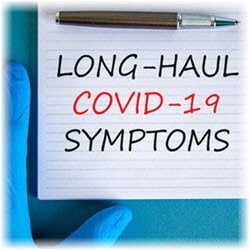Signs You May Have Long-Haul COVID-19
 If you have these symptoms after you’ve had COVID-19, you may be a long-hauler.
If you have these symptoms after you’ve had COVID-19, you may be a long-hauler.
Most people who have COVID-19 get better within days or weeks of first getting infected with the virus. Some don’t have any symptoms at all. But there are also people who experience a wide range of ongoing, returning or new symptoms weeks or months after a COVID-19 diagnosis. These people have what medical professionals refer to as long-haul COVID-19 or post-acute COVID-19 and they may be referred to as long-haulers.
Experts around the world are still learning about long-term effects associated with COVID-19. It is also not yet known why some people experience lingering or new health issues while others do not. What is known is that these symptoms can happen to anyone who has had COVID-19, even those with only mild illness or even no symptoms at all. Symptoms can last weeks, months or longer.
What are the symptoms of long-haul COVID-19?
These are some of the most common long-haul COVID-19 symptoms, as reported by the Centers for Disease Control and Prevention (CDC):
- Lung issues, like shortness of breath, difficulty breathing or cough
- Fatigue
- Difficulty thinking or concentrating (brain fog)
- Rapid heartbeat or heart palpitations
- Joint, muscle, chest or stomach pain
- Headache
- Changes in taste or smell
- Lightheadedness
- Pins-and-needles feeling
- Sleep problems
- Mood changes
- Diarrhea
- Fever
- Rash
- Menstrual cycle changes
- Symptoms that get worse after physical or mental activities
People with more severe initial illness may also experience autoimmune-like conditions. The immune system may mistakenly attack healthy cells in the body, causing inflammation or tissue damage. Other multi-organ issues may also occur, affecting many or all body systems, including the heart, lung, kidneys, brain and skin.
If you were in the hospital or were severely ill, you may also experience severe weakness, exhaustion, problems with thinking and judgment or post-traumatic stress disorder (PTSD). These symptoms may not be caused by long-haul COVID-19 but instead may be a result of your hospitalization or severe illness.
What should you do if you have long-haul COVID-19 symptoms?
Depending on what symptoms you have and the severity of them, you may need to see a doctor. Since symptoms vary widely, so too will the type of doctor you see. It’s best to start with your primary doctor. After reviewing your symptoms and your medical history, you may be given a treatment plan or will be referred to a specialist as needed.
Visit PIHHealth.org/PrimaryCare or call 562.789.5982 to find a Primary Care physician near you.